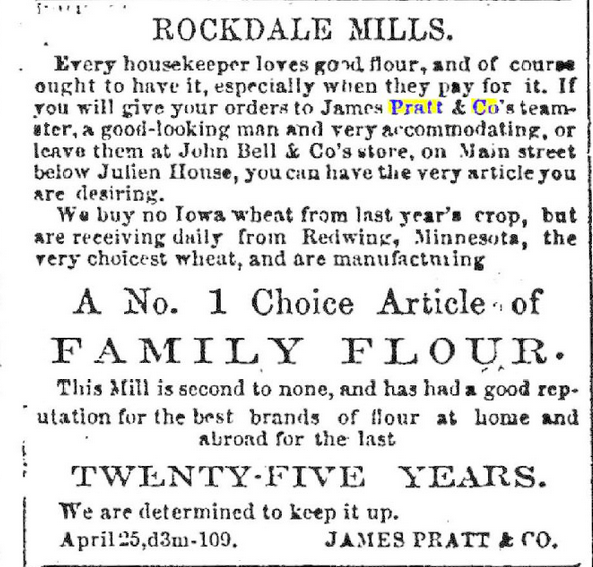Encyclopedia Dubuque
"Encyclopedia Dubuque is the online authority for all things Dubuque, written by the people who know the city best.”
Marshall Cohen—researcher and producer, CNN
Affiliated with the Local History Network of the State Historical Society of Iowa, and the Iowa Museum Association.
PRATT AND COMPANY: Difference between revisions
Jump to navigation
Jump to search
(New page: PRATT AND COMPANY. A small flourmill erected in 1840 by James Pratt on Dubuque’s south side. Reconstructed with rock in 1858, the mill was considered one of this area's finest examples o...) |
No edit summary |
||
| (4 intermediate revisions by the same user not shown) | |||
| Line 1: | Line 1: | ||
PRATT AND COMPANY. | [[Image:prattco.png|left|thumb|350px|Photo courtesy: Telegraph Herald]]PRATT AND COMPANY. Pratt and Company was a small flourmill erected in 1840 by James Pratt on Dubuque’s south side. Reconstructed with rock in 1858, the [[ROCKDALE MILL]] was considered one of this area's finest examples of masonry work. | ||
Utilizing a bran duster, an innovative device that saved 3 percent of the flour, the mill produced three hundred barrels daily. Northern competition closed the mill in 1872. | Utilizing a bran duster, an innovative device that saved 3 percent of the flour, the mill produced three hundred barrels daily. Northern competition closed the mill in 1872. | ||
[[Category: Flour and Feed]] | |||
Latest revision as of 01:29, 8 March 2019
PRATT AND COMPANY. Pratt and Company was a small flourmill erected in 1840 by James Pratt on Dubuque’s south side. Reconstructed with rock in 1858, the ROCKDALE MILL was considered one of this area's finest examples of masonry work.
Utilizing a bran duster, an innovative device that saved 3 percent of the flour, the mill produced three hundred barrels daily. Northern competition closed the mill in 1872.


